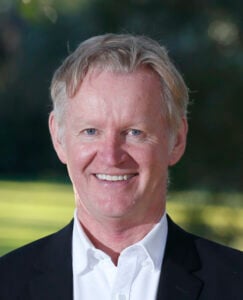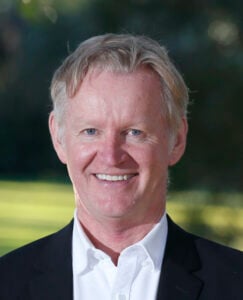AWP CEO reflects on a career of transformational partnerships

Australian Water Partnership (AWP) CEO Nick Schofield has worked his way through a mind-boggling array of water sector fields, ranging from catchment hydrology and land-use, through to government policy and international water development.
But, after three years leading the AWP, the time has come to move on. Reflecting here on his time in the water sector, Schofield says partnerships have factored in most of his roles, an element of the sector he says is crucial for working towards solutions to some of our biggest challenges.
I've been in the water sector for 43 years; that’s quite a long stint. I trained as an astrophysicist, but then soon moved into water. Initially, I came to Australia in 1980 for a three-year academic position. After that, I entered into the world of real water challenges, if you like, in an effort to do my part in creating change.
During 12 years in Western Australia, I ran a number of programs in mining, salinity, forestry, and other land-use issues. And climate change, which is of course becoming a major issue.
But common to all this work has been working in partnerships with industry, government and communities. When I came to Land and Water Australia, I managed 10 national partnership programs over 14 years, which gave me really good experience for coming across to the AWP.
Working together
First and foremost, AWP is a partnership. And partnership has been a theme throughout my whole career in Australia. And one of the key challenges I’ve faced in my various roles is working to ensure programs really do work like a partnership.
When we're delivering activities in developing countries, we take a consultative approach. We don't throw solutions at people. We find out what they're really looking for and whether or not Australia really has a unique offering to give them.
A lot of partnership work is about building relationships, building trust and working together. And the approach has served us well, in terms of our international partners. We work with the World Bank, Asian Development Bank, International Water Management Institute, UN Food and Agriculture Organisation and the International Centre for Integrated Mountain Development.
Most recently, we formed a collaboration with the Pacific Community that works right across the region. This involves maintaining good relationships with major organisations in the region. If we can influence how they implement their work, how they prioritise their initiatives, we can get good leverage outcomes. That’s been a very important part of our strategy.
Promoting success
Another area of great interest to AWP has been capturing knowledge about how Australia manages water and promoting that approach elsewhere. We produce the Australian bookcase of products, and we have an international bookcase, too.
Interestingly, how we manage water day to day hasn't been very well documented in the past, but we’ve had a very long water reform journey created, in my view, through policy, innovation and community champions.
It’s been delivered largely by on-the-ground managers and operators who learned how to implement new works and initiatives; whether it's water markets or water-sensitive cities, they learnt how to do that on the job. This practical delivery has only been possible through consultation and support of communities. And it’s been a tremendous achievement for Australia to have done those kinds of things.
We've got good recognition internationally for basin planning, environmental flows, irrigation modernisation, as well as how our water utilities work and function. But we need to be able to promote all of these things in ways that are accessible to developing countries.
In response to this gap, AWP has been developing a set of documents that capture the practical implementation and real-world experience of what the Australian water sector has achieved.
Keeping it real
Collaboration is absolutely the way to go in terms of achieving more with less. A lot of the challenges we face as a sector are very complex. They run in every direction; they've got lots of different drivers. But a lot of people are suffering from poor water management around the world and this needs to be addressed.
It is really important to build partnerships and relationships, and be able to maintain them. I've worked with different agricultural industries and mining companies, and I’ve found they really come to the party when they're engaged in the right way, when the relationship is genuine, and you're all working to solve the same problems.
When you give companies or organisations the support to solve the problems arising, they're the first to take the opportunity. Some of my best experiences have been working with the private sector and industries. We've achieved some terrific results in many programs by ensuring genuine partnerships come first. I think it's well-recognised today that most organisations have a preference for working that way.
Working in international development, there's other elements at play — there are many different cultures involved, and often different politics, too. But when you get to know people and you take the time to understand them, and they you, you can start to build relationships and work towards outcomes. The human side of water work is tremendously important.
What’s next
While I’m leaving my position at AWP, I do intend to maintain some connection to the water sector. I'm imagining a combination of the right type of consulting, work that suitably draws on my experience and knowledge.
I would like to do more of my own research around the big issues facing the world and sustainability, and engage in more writing about those things. But I also look forward to having a lot more time now for recreation and family.


